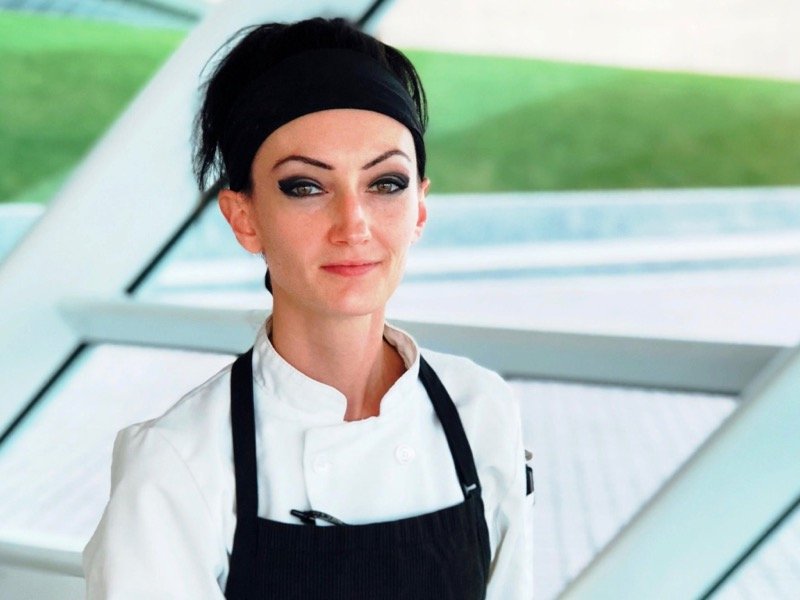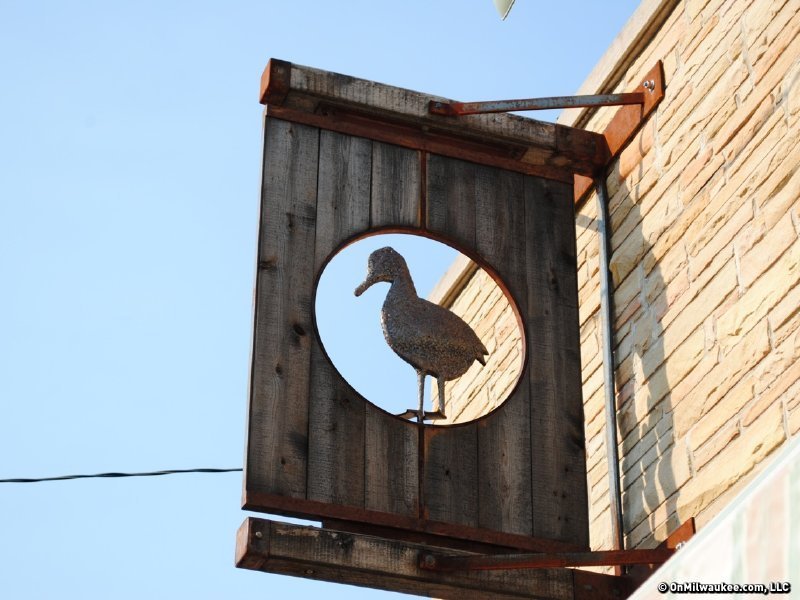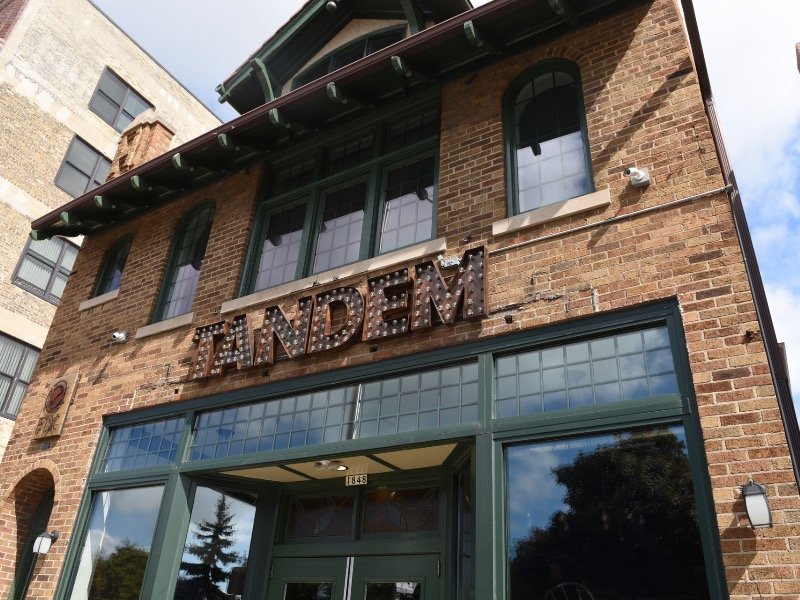She’s beautiful. And badass. And passionate about good, simple food. When it all comes down to it, Georgia Pellegrini is a trailblazer in more ways than one.
The accomplished chef, author and outdoorswoman has cemented her spot as spokesperson for the new age of hunting and gathering, introducing old-school, back-to-the-land ideals to a new generation of professional women who may not otherwise give much thought to it.
Raised in New York’s Hudson Valley, Georgia Pellegrini grew up on the same land in New York that her great-grandfather owned and worked. Her connection to nature and the deep satisfaction she got from manual labor stayed with her through college.
"I think I was fortunate that I really grew up with a connection to the land – eating trout for breakfast, raising chickens, and living with an aunt who knew the names of every plant on the land," she says. "I had a really deep appreciation for getting dirt under my fingernails."
So, after graduating from Wellesley and heading off to New York to work for Lehman Brothers, she couldn’t quite knock the feeling of discontent she had with the upscale city lifestyle.
"I think the silver lining – when you’re doing something that doesn’t quite fit who you are – is that it forces you to figure out what you’re doing when you’re happiest," she says. "I had a real desire to get back to my roots, back to the land, back to food. And not just food in terms of being a chef, but pure ingredients that came straight from the land."
So, Pellegrini went back to school – this time to get her culinary degree at the French Culinary Institute. Then she set to work in the kitchens of some of New York’s finest farm-to-table restaurants, first at Blue Hill at Stone Barns and then at Gramercy Tavern.
"I worked the same crazy hours that I worked in banking, and I made a fraction of the money," she recalls. "But, it didn’t feel like work, which made me know it was the right thing."
When her work at Gramercy Tavern required that she slaughter turkeys, Pellegrini says she had a reawakening.
"The experience was invigorating and awakened the primal part in me," she recalls. "It was emotional and intense and there was a window through which I momentarily peered and contemplated life as a vegan, but ultimately something shifted in me, I realized that I had this purpose to pay the full price of the meal, to become a responsible omnivore and understand the process from farm to plate."
Pellegrini went on to work at La Chassagnette, a Michelin-starred restaurant in the south of France, an experience deepened her desire to connect with her food – and develop a greater understanding of its origins. In fact, her first book, "Food Heroes" tells the story of 16 culinary artisans across the world who are fighting to preserve their food traditions.
When she returned to the U.S., she took the next step in her evolution toward connecting with her food. She learned to hunt. She records her journey learning to shoot, field-dress and cook wild game in her acclaimed book, "Girl Hunter: Revolutionizing the Way We Eat, One Hunt at a Time." Part of her goal in writing the book was to bridge the gap between hunters and people who are looking to eat more naturally.
"There's this sort of stereotype about hunters that they're all these white middle-aged men who just like to go out and shoot things," she says. "But that's not the case."
Her latest book caters less to the outdoorswoman and more to the urban DIY-er. In "Modern Pioneering: More Than 150 Recipes, Projects and Skills for a Self-Sufficient Life," Pellegrini teaches a concept she calls "manual literacy" and encourages readers to use thrift and elbow grease to create home décor, cook interesting meals, upcycle common items, and take on useful projects that contribute to the creation of self-sufficiency.
Pellegrini recognizes that not everyone may want to shoot, skin and butcher a deer, but she believes they may want to grow tomatoes on their small patio, reuse red wine to make popsicles or turn old glass bottles into glassware.
And she’s probably onto something.
When I heard that Pellegrini was heading to Wisconsin April 3-6 for an "Adventure Getaway" weekend at the American Club in Kohler, I decided to catch up with her by phone and ask her to share a bit more about her lifestyle, her plans for her Wisconsin visit, and the inspiration behind her work.
OnMilwaukee.com: You hunt, you fish, you cook. How accessible is the lifestyle you portray? Do you see it as something any ordinary American woman could participate in?
Georgia Pellegrini: Absolutely. And "Modern Pioneering" illustrates some of the things that that absolutely anyone could do. And it’s a true extension of my lifestyle and life.
I live in Austin right now – in an urban area. But, I have a fig tree and a loquat tree in the alley. And I have a stream down the road and a turtle I talk to.
I also have projects in my house that I made myself – like a large wooden planter box for bamboo and a concrete fountain. The guys at Home Depot looked at me like I was a crazy lady when I strolled in with a puffy skirt and flip-flops and announced I was going to pour a cement fountain. But I did it!
So, this is very much stuff that can be done no matter where you live.
I live this life, but somehow my life has become my work.
OMC: That’s why I ask the question. We see so many women – like Martha Stewart – who does all these cool things, but who has throngs of people doing it for her. And we think – that’s not practical.
GP: Exactly.
OMC: So, you don’t have throngs of people doing things for you?
GP: No, I don’t have anybody like that. I have a manager and some interns; but I’m very hands on with my life.
OMC: What was the most interesting part about pulling together all the information for "Modern Pioneering"?
GP: This book is really about teaching people manual literacy. There are small ways to do that – even if you’re busy or living in a small urban apartment.
I wanted to give people a road map for being more self-sufficient – even if the only land you have is a garden on your patio or fire escape.
I think, first of all, the hardest part was the sheer volume of content that I wanted to include. So, I think for me the most interesting part was figuring out what was most useful to include.
I’m writing for the female lawyer who lives in a NYC apartment, and her only outdoor space is a fire escape. She’s burnt out and she wants to roll up her sleeves a little bit. And maybe it’s as easy as making mozzarella cheese in 30 minutes to bring to a party.
There was so much I could put into this book, but I didn’t want it to be extreme. I wanted it to be useful – a true manual.
OMC: So, what are three "manual skills" you think everyone should think about acquiring?
PG: I love the idea of using edible flowers. I think they’re gorgeous to entertain with, but people don’t know that rose petals are edible. I like the idea of really making use of their beauty in a useful way. So, there are all these recipes in the book, based on flowers. It’s all about using nature – using its beauty and also being stylish and edgy.
So, I think the hazelnut cake or ice cubes are good examples of that.
Upcycling is a big one. Taking citrus rinds and peels and things … throwing it in a jar and making lemon or lime oil. But, I think my favorite thing is this watermelon keg. You can pull the watermelon out and eat it as a salad. But, then you use the hollow watermelon again. That’s such a fun thing for a party. You can just add water to it and you get this really delicious watermelon water. It’s something my grandmother would have done – something that doesn’t cost a lot of money.
The third thing – I love the idea of going out and pulling weeds out and turning them into food. My grandmother would always have me look for purslane. It’s this weed that’s everywhere – in the grass, in the cracks of the sidewalk. It’s delicious and nutritious and has a really high Omega 3 content.
You can find it in so many places. But, you need to have your eyes open. We’ve lost the knowledge of what things are, and getting back to that is useful. You don’t have to be a hardcore forager, but you can find things where you are and make use of them.
OMC: What are your adventure getaways like? Why did you start them?
PG: The Girl Hunter Weekends that I host happened really by accident, as a response to a lot of emails I got from women asking if they could experience an outdoor adventure with me.
I think what I realized was happening is that there were so many women looking to unravel, and empower themselves.
Some of the getaways are more rugged, and some are more refined. But, what I’ve learned from hunting with men is that women have special needs – and they want different things. Women have their own sensitive, patient, and careful nature, which makes us really wonderful in the wild. I’ve discovered that hunting can have a softer side to it. It can be stylish, edgy, alluring. And there can be this juxtaposition of rugged and stylish – and for some women, that’s what it takes for it to work for them. They want to feel feminine while they’re stepping out of their comfort zones.
Rather than going on some spa weekend – which is the same over and over – they’re doing something different. Hunting, cleaning the animals – getting their hands dirty – then cooking and sitting by the fire with a glass of scotch. And then waking up in the morning to do yoga by the lake.
These weekends are one of the most inspiring things that I get to be a part of—women come together as total strangers and step out of their comfort zone for a weekend; they leave bonded for life, with a whole bunch of new friends.
I always marvel at what a perfect combination of people it is that come together, they always click like they have known each other forever. I think it is because these weekends attract a particularly fearless kind of female.
OMC: What do you have planned for your adventure getaway coming up in Kohler in April?
PG: This event is really fairly refined. But, we’re going to have a variety of activities – pheasant hunting, a bird-cleaning class where they learn to field dress an animal, a cooking event.
There will be fishing and hiking. I think we’re going to have a scotch tasting … morning yoga on the lake, all sorts of delicious meals.
It’s really about keeping busy. It’s action packed, so it always feels longer than it is. And it’s always a really good time.
OMC: What’s unique about doing something like this in Wisconsin?
PG: The thing about Wisconsin in general is that it’s one of the parts of the country that has a lot of raw nature. And there aren’t a lot of states anymore that promote a
I haven’t been in Wisconsin yet, so that’s exciting for me. It’s wonderful to see when there’s a lot of raw nature and people are interacting with it. And I’m really looking forward to spending some time and getting to know the place. I feel really privileged to be working with the people at Kohler.
OMC: You’ve said that "self sufficiency is the ultimate girl power." Give me a better idea of what you mean by that.
PG: I realized at some point that I had a college degree, but I didn’t know how to fix my own toilet. There are all these areas of vulnerability that we all have because we’ve gotten so specialized in what we know.
I realized that I wanted to face some of those things – not because we shouldn’t be vulnerable – but because we should face our fears.
Women think they should be perfect at something the very first time. But, the idea of empowering yourself to make mistakes, and to learn to do things like changing your own tire – that’s powerful.
I think my adventure getaways are a great example. Women spend the weekend getting out of their comfort zones. And they feel taller after we’re done. They have this sort of Amazonian look in their eyes.
So, "Modern Pioneering" is a book for everyone – but especially for women, because it gives them some really great ways to exert their power and get their hands dirty.
You inspire women across the nation. But, who inspires you?
A lot of the older women – women of generations before me. They did so much, they were so strong. They were the greatest generation. They knew how to be content with very little and how to find joy in fundamentals like family and fellowship. There’s a lot of quiet strength in that generation, among the women I’ve been raised by. They taught me a love of food, and an understanding of the land…
And I don’t think you have to be masculine to do things like this and be strong. You don’t need to be dressed like a guy. You can have this sense of strength and be a woman at the same time.
Lori is an avid cook whose accrual of condiments and spices is rivaled only by her cookbook collection. Her passion for the culinary industry was birthed while balancing A&W root beer mugs as a teenage carhop, fed by insatiable curiosity and fueled by the people whose stories entwine with each and every dish. She’s had the privilege of chronicling these tales via numerous media, including OnMilwaukee and in her book “Milwaukee Food.” Her work has garnered journalism awards from entities including the Milwaukee Press Club.
When she’s not eating, photographing food, writing or recording the FoodCrush podcast, you’ll find Lori seeking out adventures with her husband Paul, traveling, cooking, reading, learning, snuggling with her cats and looking for ways to make a difference.







